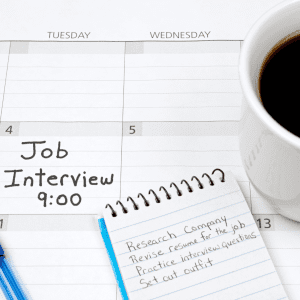For most candidates, the job interview is both the most exhilarating and nerve-wracking stage of applying for a new job. With our handy Behavioural Interview Tips guide, you will be ready to ace your interview with confidence!
Your interview preparation is as important as the interview itself. To excel on the day, it is important that you set yourself up for success by following our tips below:
1. Research the company – Make sure you know what the company does and what services it offers. You can generally find out what you need from their website and social media. Failing to understand the primary purpose of the business suggests a lack of interest in the role and the company.
2. Read the position description – Not only is it good practice to know exactly what role you are applying for and what your duties will be, your interview questions are likely to be heavily based on the Position Description (PD). You are likely to be asked questions that evaluate whether you can meet the essential requirements and expected behaviours outlined in the position description.
3. Prepare questions to ask your interviewer – At the end of your interview, you will almost always be asked if you have any questions. Employers expect you to ask questions, and asking your potential employer questions about the role highlights your genuine interest in the role and can set you apart from other candidates. It is recommended to prepare at least 3 questions, as some of these questions may already be addressed throughout the interview. Examples of these questions include:
- What is your training and onboarding process for this role?
- What do you like best about working for the company?
- How is success measured/celebrated in this role?
- Is there opportunity for career progression with this role?
- What does a typical day look like in this role?
4. Be on time – Aim to be 10-15 minutes early where possible. This demonstrates to your potential employer that you are a reliable, punctual person. If your interview is remote, prepare your technology well beforehand to ensure you have enough power, a reliable internet connection and your camera and microphone are in good working order. Set yourself up in a quiet area with a neutral, tidy background and minimal noise and distraction. If you are late for the interview, the employer will think that this is going to be common practice if you are in the role!
5. Dress appropriately – Dress for the job you are applying for. If you’re speaking to a recruiter before the interview, you can ask about the dress code in the workplace and choose your outfit accordingly. If you don’t have someone to ask, research the company to learn what’s appropriate. Ensure your clothes are clean and without holes, pet hair or loose threads, your hair is neat and professional, and your nails are free of dirt. Your attire should be professional yet comfortable; if you are uncomfortable or fidgety, your interviewer will notice!
6. Practice answering common interview questions – While you never know exactly what questions may be asked, it is good practice to enter your interview prepared. Find common interview questions covering a range of skill based and behavioural topics and practice answering them; this will give you a good basis for questions asked during the interview and may help calm the nerves.
7. Be respectful to other employees – Your interview begins when you walk in the door; your potential employer will want to see how you fit in with the team and environment, and this often happens before the interview. Be courteous and respectful to reception staff and others who walk past. Remember, these employees could be your future colleagues.

